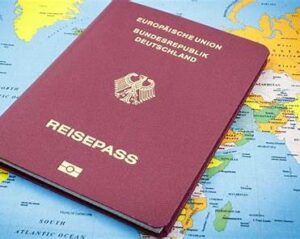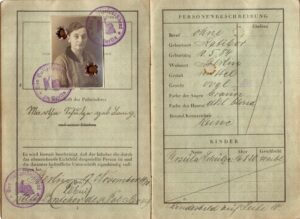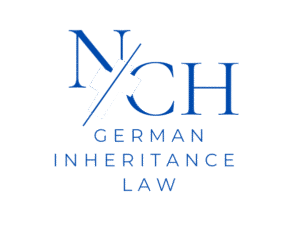German Citizenship by Descent & Restoration – U.S. Legal Help to get Your German Passport

If your parent, grandparent, or even great-grandparent was German, you may be entitled to reclaim German citizenship—even if you were born in the United States, have never lived in Germany, and don’t speak the language.
Germany’s citizenship laws have changed, and many people now qualify under expanded eligibility rules. But the legal path isn’t always obvious.
That’s where we come in. We help U.S.-based individuals determine, with clarity and precision, whether they qualify for German citizenship. This is not a guess or a generic checklist—it’s a detailed legal analysis tailored to your family history.
As a German-qualified attorney, admitted to the bar in Germany and practicing in the U.S., I provide a bridge between two legal systems and cultures. You’ll receive expert guidance grounded in law, not speculation.
- One Passport. Two Worlds. One Clear Answer.
- ✅ Our 5‑Step Legal Process for Securing German Citizenship ($299)
- Which Law Applies to You? § 5 vs § 15 StAG Explained
- Who This Is For — And What I’ve Helped Clients Achieve
- Common Questions Clients Ask Me:
- How the Process Works
- Important: Time-Sensitive: Some Claims Expire by August 19, 2031
- Frequently Asked Questions (FAQs)
- Conclusion
Which Law Applies to You? § 5 vs § 15 StAG Explained

Understanding the two key legal pathways for reclaiming or acquiring German citizenship is essential. Depending on your ancestry and family history, you may qualify under § 5 StAG (Citizenship by Declaration) or § 15 StAG (Restoration of Citizenship Due to Nazi-Era Persecution).'
⚖️ § 5 StAG — Citizenship by Declaration
You may be eligible under § 5 StAG if you were historically excluded from German citizenship due to outdated laws — even though you had a German parent or grandparent.
Common cases include:
- Your mother was German, but you were born before 1975 and couldn’t inherit her citizenship.
- Your German parent lost citizenship before you were born due to emigration or other legal gaps.
- Citizenship could not be passed down because of gender or marital status laws in force at the time.
📝 The German government introduced § 5 StAG to correct past injustices in nationality law and allow descendants to reclaim their rightful status.

🛡️ § 15 StAG — Restoration of Citizenship for Victims of Nazi Persecution
If your ancestors were persecuted by the Nazi regime and lost or were denied German citizenship, § 15 StAG offers a path to restore citizenship for you and your family.
You may qualify if:
A parent, grandparent, or great-grandparent was Jewish, politically persecuted, or fled Germany during the Nazi era.
They lost German citizenship due to discriminatory laws (e.g., the Nuremberg Laws of 1935).
You can provide documentation of lineage and persecution background.
This law is rooted in historical justice — offering restoration, not just naturalization.
Who This Is For — And What I’ve Helped Clients Achieve
Over the years, I have worked with clients across the United States and beyond who never imagined they could qualify for German citizenship. Some had been told "no" in the past. Others didn’t even know citizenship was a possibility. The truth is: the law has changed, and it now recognizes many people who were historically excluded.
For example, I recently worked with a woman in California whose grandmother fled Germany in 1938. Her family had lost touch with their German heritage, and no one thought they could "get it back." But under Germany’s current law—especially the restitution provisions tied to Nazi-era persecution—this client was not only eligible for citizenship, she now holds a German passport.
Another client, born in Texas in 1960, was the son of a German mother who had lost her citizenship automatically upon marrying a U.S. soldier in the late 1950s. For decades, he assumed that meant the end of the line for his German roots. In fact, under the 2021 reform, this form of gender-based discrimination was corrected—and we successfully reclaimed his citizenship.
One particularly moving case involved a Jewish family whose German nationality was revoked under the Nazi regime. The client’s grandparents were deported, and her mother was born in exile. Even though decades had passed, and the documentation was scattered across multiple countries, we pieced together the family’s history and had her citizenship reinstated under Article 116 of the German Basic Law.
Common Questions Clients Ask Me:
“My mother was born in Germany, but I was born abroad in 1962—do I qualify?”
“My parents became U.S. citizens in the 1960s—did they lose their German citizenship?”
“I was adopted by a German stepfather as a child—can I claim citizenship through him?”
“I was told I don’t qualify, but I heard the law changed. What’s different now?”
These are exactly the types of cases I handle—legally complex, historically sensitive, and deeply personal.
How the Process Works
1️⃣ Send Your Documents
Birth certificates, passports, or family tree — we’ll tell you exactly what’s needed.
2️⃣ Legal Eligibility Check
We analyze your case under §§ 5 or 15 StAG and assess if you qualify.
3️⃣ Strategy Call
We explain the legal path, timelines, and next steps in plain English.
4️⃣ Full Representation
We handle the application, submit it to German authorities, and manage all communication.
5️⃣ Citizenship + Passport
We support you through final approval, certificate recognition, and passport issuance.
Important: Time-Sensitive: Some Claims Expire by August 19, 2031
However, many of these rights are time-limited. Under transitional provisions, eligible individuals have until August 19, 2031 to submit their applications. That may seem far away, but in practice, collecting records, verifying lineage, and preparing a legally sound application can take several months—especially if archives or international coordination is involved.
Don’t leave it to chance, misinformation, or last-minute panic.
Get a professional assessment and act from a place of clarity.
Frequently Asked Questions (FAQs)
Conclusion
Citizenship Is More Than a Passport—It’s Identity, History, and Belonging
Claiming German citizenship isn’t just about legal status. It’s about restoring a connection that may have been lost through war, discrimination, or migration. It’s about honoring your family’s story—and securing a future in two worlds.
This process can feel overwhelming. German attorney Nicola Casper-Hoesl makes the process clear, structured, and personal. You’ll know where you stand, what to expect, and how to move forward—with a trusted advisor at your side.
Nicola is very knowledgeable about German /International Law and listens to her clients’ needs during challenging times in their lives.
She is very kind , responsive and efficient in her email & phone conversations. I was delighted to work with her in solving my niece’s case.
I highly recommend Nicola if someone needs any law advice about Inheritance or German/International law cases.
Nicola helped our family recover a €250k inheritance stuck in German probate—without us ever leaving California. Her team handled everything in 8 months.
Nicola is an exceptional attorney with extensive knowledge in German inheritance law. Navigating international legal matters can be frustrating and complex, but Nicola made the process smooth and stress-free. Her professionalism along with clear communication were invaluable throughout the entire ordeal.
If you are in need of a knowledgeable, reliable, and supportive lawyer for inheritance matters involving Germany, Nicola is the best choice! I highly recommend her.
Provided expert legal guidance through a very complex inheritance situation involving German banks, courts, and tax authorities. Extremely detailed, diligent, and knowledgeable. I would not have been able to resolve all the legal issues without her help. Very highly recommended!
During a very challenging time both emotionally and logistically, I could always count on Nicola. She expertly guided me through the ins and outs of German inheritance law. It was a pleasure to work with her.

